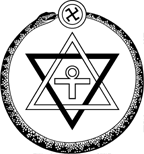This is an old revision of this page, as edited by 218.167.169.39 (talk) at 02:26, 19 January 2007 (revert--Theosophy is much broader than TS). The present address (URL) is a permanent link to this revision, which may differ significantly from the current revision.
Revision as of 02:26, 19 January 2007 by 218.167.169.39 (talk) (revert--Theosophy is much broader than TS)(diff) ← Previous revision | Latest revision (diff) | Newer revision → (diff)
Theosophy, literally "wisdom of the divine" (in the Greek language), designates several bodies of ideas. The term has been used, for example by the neo-Platonist philosopher Ammonius Saccas, as well as by certain followers of Emanuel Swedenborg and Jacob Boehme. The term may also refer to the kind of Kabbalah taught by Isaac Luria.
A formal definition from the Concise Oxford Dictionary describes Theosophy as "any of various philosophies professing to achieve a knowledge of God by spiritual ecstasy, direct intuition, or special individual revelation; esp. a modern movement following Hindu and Buddhist teachings, and seeking universal brotherhood."
The "modern movement" alluded to here--though in fact non-theistic--is the Theosophical Society founded by Helena Petrovna Blavatsky and Henry Steel Olcott in 1875. This society has since split into a number of organizations, some of which no longer use the term "theosophy". Members of this tradition view Theosophy as a "body of truth" that may be found in various ancient philosophies as well as world religions. They emphasize a distinct body of teachings received from the Masters of the Great White Brotherhood, through Blavatsky and others, describing the spiritual evolution of the universe and humanity.
| Theosophy | |
|---|---|
| Theosophical Society founders | |
| People | |
| Theosophical texts | |
| Philosophical concepts | |
| Institutions | |
| Publications | |
| In relation to ... | |
| Related | |
